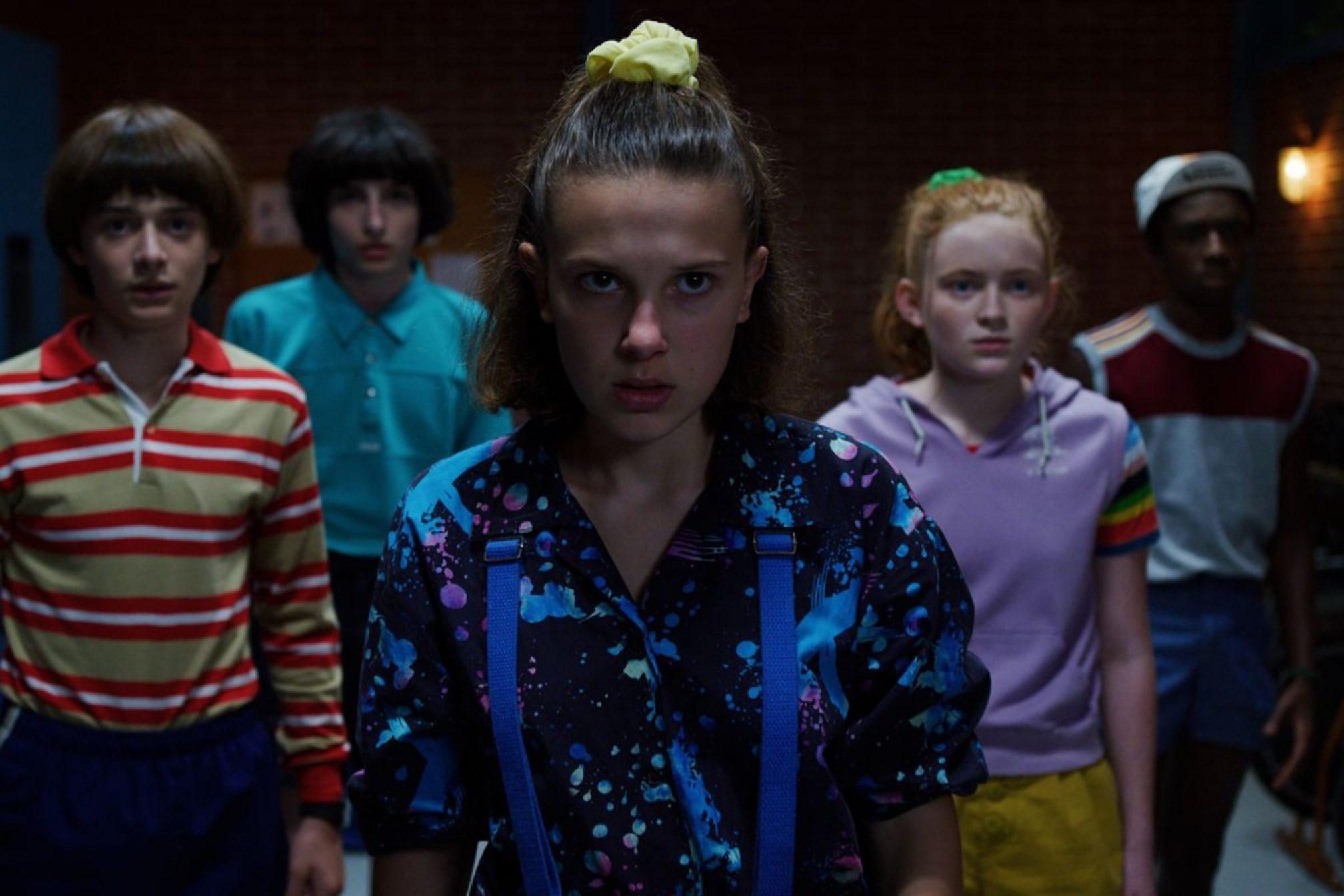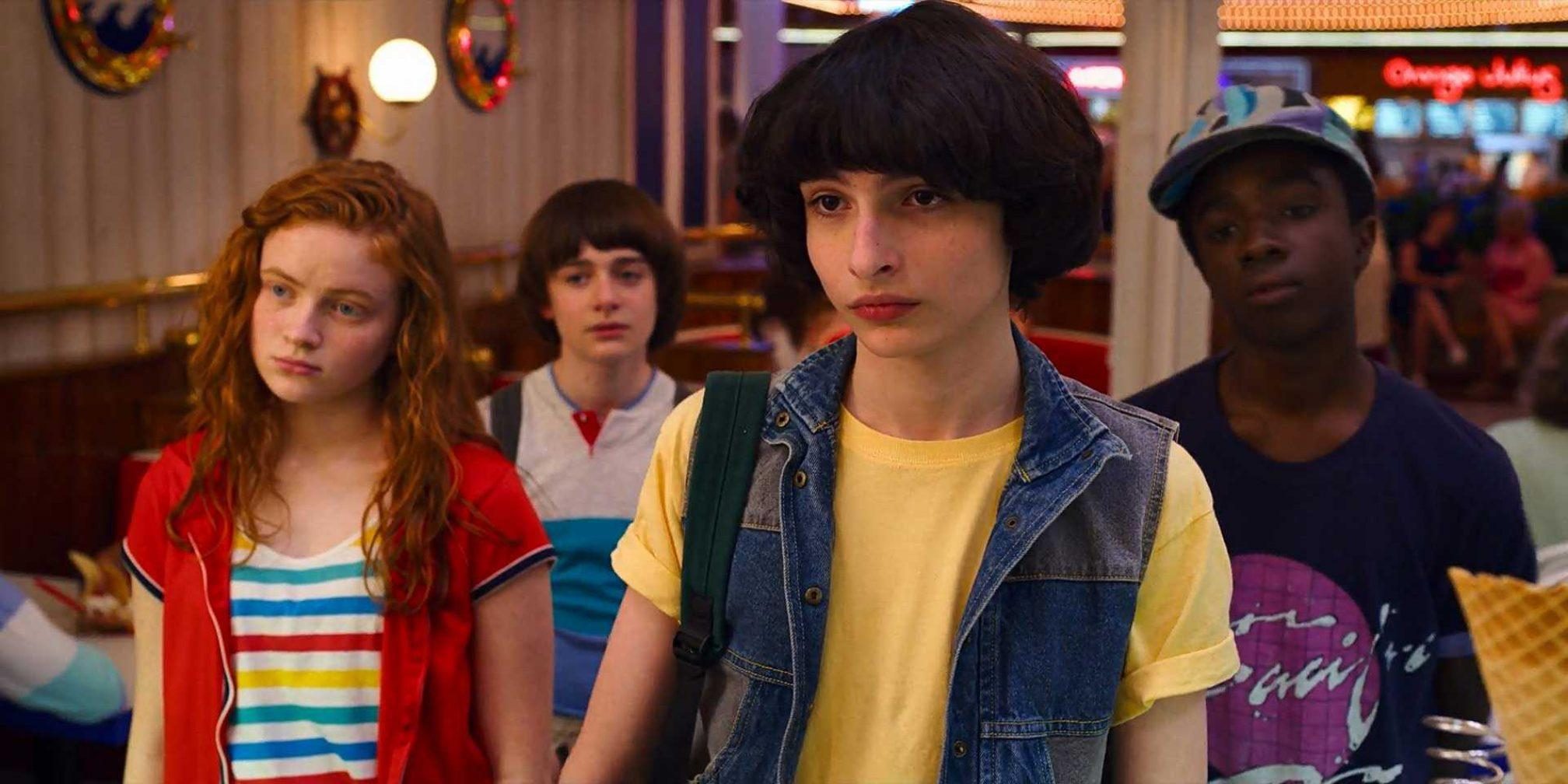 Culture
Culture
Stranger Things’ soundtrack really needs you to understand that it's 1985
Netflix hit Stranger Things' soundtrack leans heavy into literal translations of '80s hits in season three
One of the first scenes in Stranger Things’ third season finds Mike Wheeler and Eleven (who now goes by El) kissing on her bed in Hopper’s cabin. Corey Hart’s 'Never Surrender' blares on the radio, and Mike suddenly pulls back.
“Nobody wants to know you nowww,” he sings along, eyes screwed shut. He pumps his fists to the beat: Bam-bam. “And nobody wants to show you howww!” He grabs El’s hands abruptly and roughly jerks her body along to the music as he bellows the lyrics.
“Mike, stop,” El pleads, half laughing, half bewildered.
The music swirls around them as Mike opens his eyes. “You don’t like it?”
El gives him a skeptical, searching look before busting out an honest answer: “No!”
The scene is a microcosm of Stranger Things’ often fun, sometimes frustrating third season. After two seasons of supernatural adventures, the show returned on July 4 with a fresh run of episodes heavily inspired by action movies like Red Dawn and Terminator.
While past seasons of Stranger Things relied on viewers to pick up on subtle '80s Easter eggs, season three is bigger, louder and more bombastic–which doesn’t always work in its favor. Too often, season three’s '80s references feel jarring, almost like being shaken by someone whose gentle presence you’ve come to rely on.
Stranger Things’ pop culture references are an important component of what originally made the show a surprise hit during the summer of 2016. Its soundtrack combines '80s hits with a retro, synth-heavy score by Kyle Dixon and Michael Stein, who play under the name S U R V I V E. The duo’s ability to craft a moody atmosphere was so effective that the first season’s soundtrack has been released as a double vinyl in nine distinctly colored pressings.
From its first cold open’s setting in the Soviet Union, Stranger Things’ third season is meant to disorient viewers. Nancy, Jonathan and Steve have graduated from high school and are navigating disappointing first jobs. Meanwhile, Mike isn’t the only one spending the summer of 1985 with a girlfriend. Lucas and Max are officially dating–in the on again, off again way that defines some high school relationships–and Dustin returns home from science camp with tales of a beautiful, whipsmart girlfriend who went home to Utah. After suffering unimaginable trauma during the first two seasons, late blooming Will Byers is in danger of being left behind.

The gang’s fracturing relationships and differing levels of maturity are as difficult to navigate as the Upside Down–which is back, of course, this time thanks to a team of Soviet operatives who have infiltrated Hawkins for reasons that never become exactly clear, beyond giving the show an excuse to riff on Cold War movies. Absent the glow of childish wonder, the show skews toward shallow tangents that feel less satisfying than previous seasons.
Season three’s soundtrack exemplifies this pattern. Instead of building a foundation of understated nostalgia, well-known radio hits tend to steal entire scenes when they’re blasted at top volume. Likewise, gags (such as a bizarre and ill-timed conversation about New Coke) drag on too long, interrupting Stranger Things’ pacing or even derailing the plot’s forward momentum.
For example, the season’s first episode establishes Billy, Max’s chaotic older brother, as the town’s stud lifeguard. A slow motion shot of Billy peering over his sunglasses at Mrs. Wheeler’s backstroke is set to Foreigner’s 'Hot Blooded'. The plot point feels as forced as the on-the-nose song choice; the pair’s brush with adultery is introduced and unmade almost instantly, with no time to build evidence of Mrs. Wheeler’s marital dissatisfaction.

At best, the scene establishes Billy’s role at the pool and adds halfhearted depth to Mrs. Wheeler’s character; a less generous reading might suggest the plot point was engineered as an excuse to play the 'Hot Blooded' in the first place.This pattern repeats a few scenes later, when Mike and El crank up the radio to disguise another extended makeout session while Hopper nervously rehearses a boundaries-setting speech in the next room. REO Speedwagon’s 'Can’t Fight This Feeling' is a painfully literal song choice, and Hopper’s angry discomfort seems equally overblown and disproportionate to the relatively mild situation. Once again, Stranger Things forces the plot forward by using music to tell us what’s happening rather than showing a more satisfying slow build.
Despite these flaws, there’s still plenty to enjoy during Stranger Things’ third season. Despite a less reliable batting average, the show’s '80s references occasionally enrich the story with playfulness or depth.
The best song choice arguably appears in the third episode, when Will startles Mike and Lucas awake with a fluttering flute song. Taking advantage of his friends’ Pizza Hut-and-Orange Crush hangover, Will (who is dressed in a purple robe and matching cap) manages to ambush them into a round of D&D. The scene momentarily recaptures what’s always been great about Stranger Things: its ability to delicately portray the painfully awkward, funny ways kids attempt to connect with one another.
As a surprise element, the song is a purely comic choice–but unlike the season’s attention-hogging radio hits, it also adds character-building depth. Called 'The Pod Dance', the song was written for a 1982 fantasy film called The Dark Crystal. (Its composer, Trevor Jones, went on to score Labyrinth in 1986.) Despite Mike and Lucas’ attempts to outgrow their nerdy roots, it’s utterly believable that Mike would still keep the soundtrack stashed in his basement.
Finally, S U R V I V E’s understated score remains a highlight of the season. In the first episode, the prickling whir of cicadas in an Indiana field blends perfectly with subtle drop and grinding percussion that characterizes the Mind Flayer’s lair in an abandoned warehouse. The beat doubles with the gorey pops of rats mysteriously exploding.
S U R V I V E’s score also manages nimble mood shifts that aren’t possible with brash radio hits. When Joyce Byers settles in front of the television with a sad microwaved dinner, a low, blurred hum poignantly accompanies bittersweet memories of her now-deceased boyfriend, Bob Newby. As the camera pulls back, the same song effortlessly escalates into a jet engine-like rush as Joyce’s refrigerator magnets began to shake and topple to the floor, signaling the return of supernatural activity in Hawkins.
As well-executed as these moments are, Stranger Things stumbles as often as it triumphs. The final episode’s action regrettably halts for an extended duet by Dustin and his new girlfriend, Suzie, under the flimsy ploy that it’s the only way Dustin can obtain a mathematical code needed to break into the Russians’ underground lair. The moment clumsily panders to the young casts’ impressive roster of Broadway credits, and according to The Hollywood Reporter, it caught some by surprise.
"I was on set and I heard [actress Maya Hawke] going around the warehouse singing 'NeverEnding Story' and I had no idea that that was a part of the narrative of the show," S U R V I V E’s Michael Stein told The Hollywood Reporter. "And I was like, why is she singing 'NeverEnding Story’?"
It’s a great question, and like other odd choices that deflate tense moments and distract from the show’s suspense, the reasoning remains unclear. By the end of season three, only one thing is certain: No matter how far Joyce Byers moves her family away from Hawkins, the Upside Down’s monsters won’t be far behind.
Watch season three of Stranger Things now streaming on Netflix.
Michelle Delgado is a freelance writer based in DC. Follow her work online, through her newsletter, or on Twitter.


